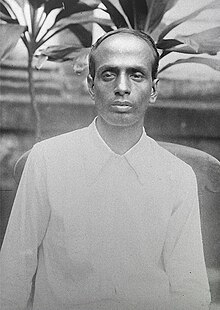
Back سوريا سين ARZ সূর্য সেন Bengali/Bangla Surya Sen German سورایا سن Persian સૂર્ય સેન Gujarati सूर्य सेन Hindi Surya Sen ID സൂര്യ സെൻ Malayalam ਸੂਰੀਆ ਸੈਨ Punjabi سوریہ سین PNB
Master Da Surya Sen | |
|---|---|
 Sen in 1924 | |
| Born | 22 March 1894 |
| Died | 12 January 1934 (aged 39) |
| Cause of death | Execution by hanging |
| Nationality | British Indian |
| Organization(s) | Indian National Congress, Jugantar, Anushilan Samiti |
| Known for | Chittagong armoury raid |
| Political party | Indian National Congress |
| Movement | Indian Independence movement |
| Criminal penalty | Capital punishment |
| Criminal status | Executed |
| Spouse | Puspa Sen |
| Signature | |
| Anushilan Samiti |
|---|
 |
| Influence |
| Anushilan Samiti |
| Notable events |
| Related topics |
Surya Sen, also known as Surya Kumar Sen (22 March 1894 – 12 January 1934), was an Indian revolutionary[1] who was influential in the independence movement against British rule in India and is best known for leading the 1930 Chittagong armoury raid.
Sen was a school teacher by profession and was popularly known as Master Da ("da" is an honorific suffix in Bengali language). He was influenced by the nationalist ideals in 1916 while he was a student of B.A. in Berhampore College (Now MES College).[2] In 1918, he was selected as president of the Indian National Congress's Chittagong branch.[3] Sen was known for recruiting a group of young and passionate revolutionaries known as the Chittagong group. The group included Ananta Singh, Ganesh Ghosh and Lokenath Bal, and fought against the British stationed in Chittagong.[4]
He was an active participant in the Non-co-operation movement and was later arrested and imprisoned for 2 years from 1926 to 1928 for his revolutionary activities. A brilliant and inspirational organiser, Sen was fond of saying "Humanism is a special virtue of a revolutionary."[4]
After the Chittagong raid in 1930 and a fierce battle where over 80 British Indian Army soldiers and 12 revolutionaries were killed, Sen and other surviving revolutionaries dispersed into small groups and hid in neighbouring villages, launching raids on government personnel and property. Sen was arrested on 16 February 1933, tried and was hanged on 12 January 1934.[5] Many of his fellow revolutionaries were also caught and sentenced to long periods of imprisonment.[6]
- ^ Bowman, John S. (5 September 2000). Columbia Chronologies of Asian History and Culture. Columbia University Press. p. 740. ISBN 978-0-231-50004-3.
- ^ Shah, Mohammad (2012). "Surya Sen, Mastarda". In Islam, Sirajul; Jamal, Ahmed A. (eds.). Banglapedia: National Encyclopedia of Bangladesh (Second ed.). Asiatic Society of Bangladesh.
- ^ Chakrabarti, Bidyut (1990). Subhas Chandra Bose and Middle Class Radicalism: A Study in Indian Nationalism, 1928-1940. I. B. Tauris & Co. Ltd. p. 108. ISBN 1850431493.
- ^ a b Chandra, Bipan; Mukherjee, Mridula; Mukherjee, Aditya; Mahajan, Sucheta; Panikkar, K.N. (2016) [First published 1987]. India's Struggle for Independence (Revised and updated ed.). Penguin Books. p. 251. ISBN 978-0-14-010781-4.
- ^ "Death Sentence On Terrorists". The Glasgow Herald. 15 August 1933. p. 9. Retrieved 7 January 2022.
- ^ Chandra, Bipan; Mukherjee, Mridula; Mukherjee, Aditya; Mahajan, Sucheta; Panikkar, K.N. (2016) [First published 1987]. India's Struggle for Independence (Revised and updated ed.). Penguin Books. p. 252. ISBN 978-0-14-010781-4.
© MMXXIII Rich X Search. We shall prevail. All rights reserved. Rich X Search